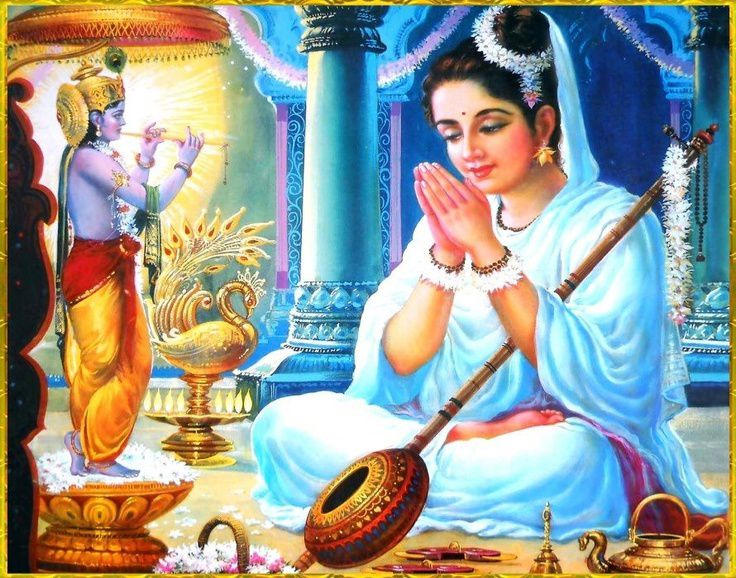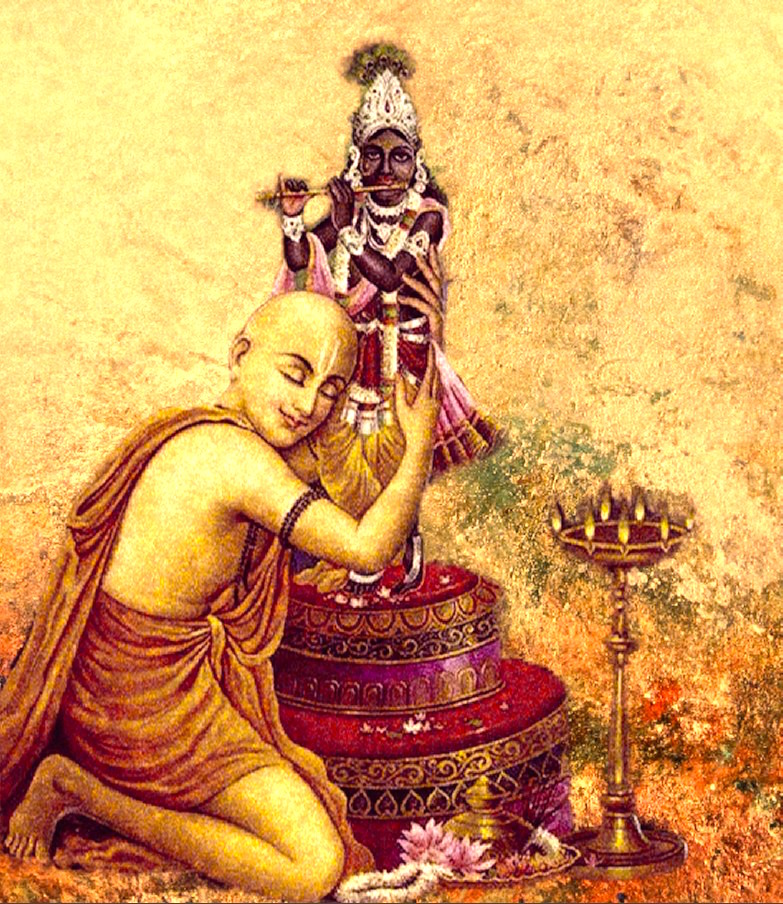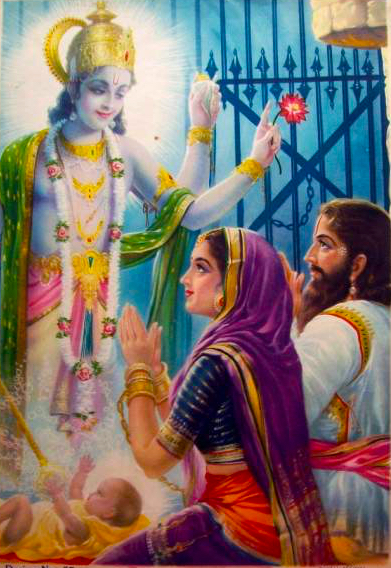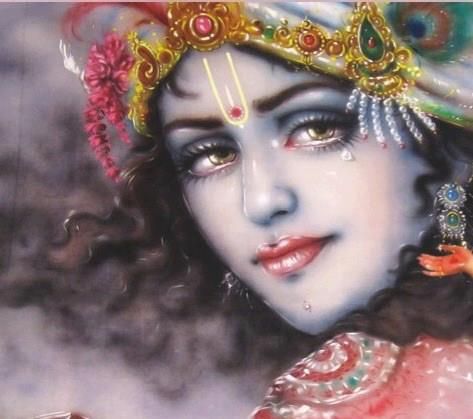Mahanidhi Madan Gopal Das
In this last article, we will describe how Krishna takes everything and gives Himself, and the power of surrendering to Sri Krishna.
Most pious Bharatvasis believe, follow and say, “If you worship Durga or Siva you will get wealth, power and fortune. But if you worship Gopal Krishna…YOU WILL LOSE EVERYTHING! So by all means don’t worship Krishna.”
Perfect love means giving everything to that one in whom you have absolute faith, trust, confidence, dependence and hope. We will only give our heart’s treasure to that one who makes us feel completely blissful, peaceful, protected, wanted and secure without the least bit of doubt, hesitation or holding back.
For devotees, that one is the Absolute One, our beautiful, charming, sweet and playful loving master, Sri Govindadeva. Here’s the dreaded Bhagavat shloka that scares everyone away from Krishna.
yasyaham -anugrhnami,
harishye -tad-dhanam -shanaih,
tato -adhanam -tyajanty -asya,
svajana –duhkha -duhkhitam
Sri Krishna said, “O Yuddhishthira! If I especially favor someone, I gradually take away all one’s money. Then one’s family, relatives and friends reject one because one is poor. Then, one repeatedly suffers one misery after another.”
For materialists this verse is poison. But for devotees this verse is amritam; positive encouragement confirming Krishna’s reciprocation with them in love, anugraha, Krishna’s kindness on them. Devotees may have trouble advancing in bhakti, so Krishna lends a hand, takes away all the undesirables, and pulls the struggling bhakta to His sweet lotus feet. Such is the sweet kindness of a true lover, our eternal, benevolent master Shyamsundar.
Sri Visvanatha Cakravartipada comments: “One suffers when one loses one’s money, and suffers even more when rejected by one’s family and friends. Krishna bhaktas, however, experience both happiness and distress; not as the fruits of their karma (material work), but as incidental effects of their loving reciprocation with their sweet master Sri Krishna.
“Devotional scriptures such as Sri Bhakti-rasamrita-sindhu explain how a Vaisnava is relieved of all karmic reactions, including the unmanifest ones (aprarabdha), those about to manifest (kuta), those barely manifesting (bija), and the full manifest present karmas (prarabdha). As a lotus gradually drops its many petals as it dries, all the karmic reactions of a bhakti sadhaka are destroyed one by one.
“Gopala Tapani Upanisad (1.14) says, ‘Krishna bhakti bhajan means concentrating one’s mind on Krishna without selfish material desires in this life or the next. This bhajan destroys all karma.’
“This verse means that by becoming freed from material desires due to Krishna taking away everything, a devotee can fix one’s mind and senses in Krishna’s seva and become free from karma. Therefore, by doing bhajana all karmas are destroyed, even though the devotee is still situated in the material body. This happens due to the inconceivable mercy of Krishna.
“It appears that the happiness and distress devotees experience resembles ordinary karmic reactions (prarabdha). However, they are actually personally given by Krishna Himself. A mature devotee recognizes the superficially good and bad conditions one encounters as signs of the direct guidance of our ever well-wishing Master Sri Krishna.
‘But if Krishna is so compassionate to His devotees, why does Krishna expose them to special suffering?’
“This analogy answers your question: A very affectionate father takes the responsibility of restricting a child’s play and makes them go to school. The father knows that this is a genuine expression of his love for them, even if the children cannot appreciate it.
“Similarly, Sri Krishna is mercifully strict with all His devotees, not just the immature ones struggling to become qualified. Even perfect saints like Prahlada and Dhruva were subjected to great tribulations. But in the end the Sri Krishna gave them profuse enjoyment of wealth and material happiness.
“Thus the conclusion is that only Sri Krishna Himself, being affectionate to His devotees, knows His intentions and no one else. But you may question, ‘What’s the difference between the happiness and distress caused by one’s own karma and that given directly by Krishna?’
“Material happiness and distress, arising from karma, leave a subtle residue, more seeds of material desire (karma-bija) which cause future entanglement. Such enjoyment and suffering tend toward degradation and increase the danger of falling into hellish oblivion.
“However, the happiness and distress arranged by Krishna’s will for His devotee leave no trace after their immediate purpose has been served. Moreover, Krishna’s devotees enjoy this reciprocation with Krishna and will never fall down into hell.
“Yamaraja himself confirms this point (Srimad Bahgavatam 6.3.29); ‘O Yamadutts! Bring me the non-devotees who have never served Krishna, never once bowed to Krishna, never chanted Krishna’s name and qualities, and whose minds have never remembered Krishna’s lotus feet.’
“Thus for Krishna’s devotees there is no danger of going to hell. Because devotees are objects of Krishna affection (anugraha 10.88.8), their suffering is never extreme. How can one consider the suffering arising from karma and that given personally by Krishna to be equal?
“One is like the pain arising from getting beaten by an enemy, and the other is like that caused by one’s mother; one is like poison and the other is like nectar.
‘But wait a minute. Since Krishna can do anything, can’t Krishna accomplish His purposes without giving distress to His devotees?’
“No! Although Krishna is the reservoir of unlimited pastimes, He cannot accomplish His purposes without this. But when Krishna sometimes gives suffering to His beloved devotees, that suffering gives rise to great pleasure, just as a stinging ointment cures a patient’s infected eye.
“The suffering given to devotees by Krishna increases their eagerness to call upon Krishna to appear and come to them. Moreover, if the devotees were complacently happy all the time, Sri Krishna would have no reason to appear in this world.
“And without seeing Sri Krishna in His original, human-like form, how would the devotees on earth be able to enjoy playing in the nectar ocean of the rasa-lila and Krishna’s other wonderful, sweet Vraja lilas?
“In the next verse (Srimad Bahgavatam 10.88.9) Sri Krishna elaborates more the anugraha, or compassionate mercy that He bestows upon His Hari bhaktas. Here Krishna says, ‘After I take away everything from My devotees, they become frustrated in their attempts to make money. Then if they befriend the devotees, I will give them special mercy.’
“This second special mercy (anugraha) from Krishna means Krishna is saying, ‘I will cause an extraordinary shower of sweet bhakti-rasa to rain down on My devotees. It was for this purpose that My first mercy, of taking away everything (10.88.8), bore the fruit of tormenting pain. In other words, I will give mercy by giving My very self to My devotee.’”
Salvation Through Surrender
In part one, we described how fear of maya and the fear of falling down from the path of bhakti are helpful for spiritual advancement. The following commentary on Srimad Bhagavatam verse (10.87.50) shows that simply by surrendering to Shyamsundar one will become free from all fear and achieve liberation.
Sri Visvanatha Cakravartipada: “In this verse, Shukadev Goswami says, ‘By surrendering to Sri Krishna one can escape the embrace of illusion, just as a dreaming person forgets one’s own body. One who wants freedom from the fear of rebirth should constantly meditate upon Bhagavan Sri Hari (nirasta –yonim –abhayam, -dhyayet –ajasram –harim).’
“Shukadeva explains how the jiva can transcend material existence by devotion to Krishna: ‘By surrendering to Bhagavan Sri Krishna, the jiva, who is helplessly bound in the embrace of illusion, lies down paying dandavats again and again to Krishna. By that surrender one becomes totally free from maya.’
“This means that the devotee gives up ignorance by abandoning one’s false identification with the material body. In some cases, Sri Krishna may show special consideration for one He favors, regardless of whether any sadhana has been performed or not.
“Even if a jiva has not practiced solitary bhajana for attaining liberation, still merciful Sri Krishna dispels one’s illusion and liberates one just as He did even for demons like Putana, Agha, Baka and Keshi who never ever did any spiritual practices. This proves Sri Krishna’s unique position as the topmost form of the Personality of Godhead.
“Knowing this, devotees should abandon all their doubts and fears, and just incessantly meditate upon Bhagavan Sri Krishna, whose absolutely charming sweetness steals away the mind of all those who love Him.”
Sri Visvanatha Cakravartipada ki jai! Krishna sharanagati ki jai! Jai Jai Sri Radhe!
Eager to know more about karma? Please read our articles from serie “Karma Trilogy and Freedom” part one, part two.




